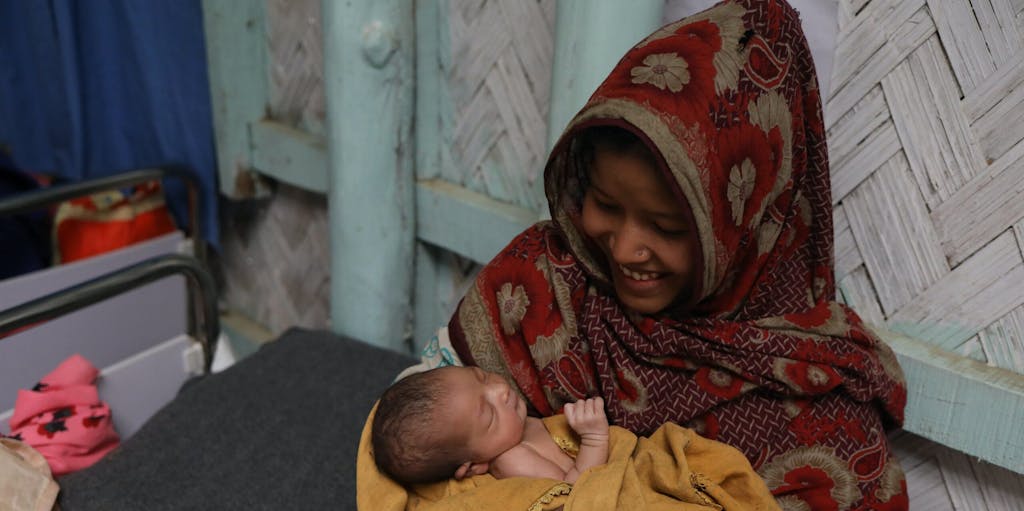Like many moms, Khusida couldn’t wait to meet the baby she had carried for 40 weeks. Her life had been so hard. She and her husband Mohammad had fled violence and bloodshed in Myanmar. Now, they lived with nearly a million other Rohingya refugees in a sprawling camp in neighboring Bangladesh. Life for a Rohingya refugee family, particularly one with a Rohingya baby on the way, was very uncertain.
Last month, Khusida went into labor and called on midwives for help. But she wasn’t able to deliver the baby, and her pain got worse.
Khusida and Mohammed finally decided to go to a Food for the Hungry (FH) health clinic in the refugee camp. When they arrived, the doctor asked for Khusida’s permission before the staff started handling the case. In the Rohingya culture, as with many mothers in the U.S., women prefer to deliver babies at home rather than at a clinic. They feel more comfortable in their home environment and with the help of local midwives, whom they trust.
Hours of Labor That Lead to A New Rohingya Baby
Khusida’s main worry was privacy during labor. But in the midst of deep pain, and knowing that either she or the baby could die in a difficult delivery, she asked the doctors for help. A few hours later, Khusida happily delivered their baby daughter, whom they named Rasheda Bibi.

“I wasn’t sure about coming to the clinic with my wife at first,” says Mohammad. “But when I saw that the situation was getting worse, I decided to bring her to the clinic. I can’t express how happy I am that my wife delivered the baby safely. I could never think of this happening in Myanmar.”
Indeed, in Myanmar, Rohingya families faced burned villages, shootings, and rape at the hands of government-aligned troops. The Rohingya are stateless, that is, no country claims them as citizens. Because their movements within Myanmar were restricted, they couldn’t access health care or education. Having a medical professional assist at a life-threatening birth would have been a pipe dream.
Trust Is the First Step
“When I first arrived at the clinic, I was scared,” says Khusida. “I never wanted to deliver in an unfamiliar environment. I was missing my home. The room looked dark with lots of scary medical equipment.
“But as soon as the doctor started speaking to me, I relaxed,” Khusida says. “I knew it was important for my security to receive the support of doctors who are experts in this, and who have adequate training and equipment to help me deliver safely.”
It made all the difference that Khusida’s doctor–a Bangladeshi national–understood the need to build a relationship with her, and forge trust with her.
Khusida’s daughter was the first live birth inside an FH Rohingya clinic–and five more clinic births followed through the end of February. Khusida told others about how her fears subsided, and how she overcame the difficult labor. Her testimonial is an important first step in urging other mothers to seek help for emergency deliveries.

A Healthy New Start
Khusida and Mohammad are now living with Khusida’s parents. They maintain a relationship with FH-trained community health workers (CHWs), who visit house-to-house with former clinic patients.
That’s how Khusida knew about the FH clinic in the first place–a trained CHW visited her throughout her pregnancy. And that’s how she and Mohammad knew the signs that she and the baby were in danger.
The CHWs play a vital role in the camps, going house-to-house to identify women who are expecting and helping them navigate pregnancy in such a challenging environment. In Khusida’s case, the CHW walked her from her home to the clinic, when they saw she needed help.
The vast majority of women in the camps continue to give birth the traditional way, at home with family members and cherished midwives attending. In February, FH recorded 198 births of women on the CHWs’ rosters in homes, compared to the six deliveries in the clinics. But knowing when to seek help at the clinic–and having open clinics to help–will save lives.
UNICEF estimates that 60 Rohingya babies are born each day in the camps. When FH supporters help keep the clinics operating, more of those others and babies can hope for a healthy new start.


